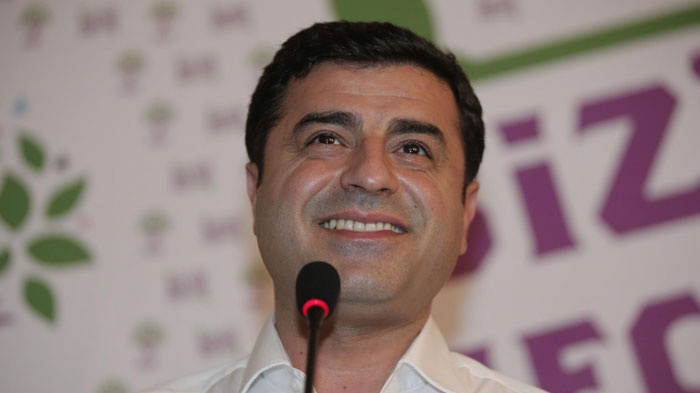Turkey election 2015:
Kurdish Obama is the country’s bright new star

The leader of Turkey’s pro-Kurdish party has emerged as a potent force in national politics after guiding his party past the notoriously tough 10% threshold to win dozens of seats in legislative elections.
In a bruising campaign, Selahattin Demirtas successfully reached out to non-Kurdish voters and won praise for his statesman-like response to a bomb attack on a party rally that killed two people just two days before Sunday’s polls.
Demirtas – dubbed the “Kurdish Obama” for his good looks and dynamic speaking style – will now lead 79 MPs from his Peoples’ Democratic Party in the new parliament after taking more than 13% of the vote.
Having easily cleared the 10% barrier, the opposition HDP is now in a position to scuttle President Recep Tayyip Erdogan’s plans to change the presidency from a ceremonial role to a much stronger executive position.
Demirtas, 42, the sole Turkish politician to rival Erdogan’s rhetorical skills, came third in 2014 presidential polls with just under 10% of the vote, which emboldened the HDP to run as a party in legislative elections for the first time.
He is credited with transforming the HDP into a mainstream liberal party, broadening its appeal beyond the main voter base of Kurds, who make up 20% of Turkey’s population, to secular Turks and also women and gays.
In a speech after the results were announced, Demirtas said his party would not form a coalition with the AKP, saying the debate over the presidential system was over.
“We, as the oppressed people of Turkey who want justice, peace and freedom, have achieved a tremendous victory today,” Demirtas said in Istanbul.
“It’s the victory of workers, the unemployed, the villagers, the farmers. It’s the victory of the left,” he said in Istanbul.
Demirtas has been the target of fierce campaign attacks by Erdogan, who belittled him a “pretty boy” who is merely a front for the outlawed separatist Kurdistan Workers Party (PKK).
Erdogan also called Demirtas an “infidel” after he pledged to abolish the government directorate of religious affairs and likened him to a “pop star” because he plays the saz, a Turkish folk lute.
But Demirtas responded to those barbs with trademark serenity, challenging Erdogan by saying: “We, as the HDP, will transform the lion in your heart to a kitten.”
Demirtas is lovingly referred to as “Selocan” (My darling Selo) by his supporters.
After Friday’s deadly attacks in the southeastern city of Diyarbakir, he urged supporters not to take to the streets and tweeted: “Peace will win.” The Turkish phrase Bariskazanacak (Peacewillwin) rapidly became a trending hashtag on Twitter.
Demirtas has sought to project a wholesome family image, frequently appearing in public with his wife Basak, a teacher, and their two daughters.
In May, he and his family appeared in an election-themed television show on a private Turkish channel in which Demirtas prepared a leisurely Turkish breakfast from scratch at his home in Diyarbakir.
“Breakfast is the only time we truly enjoy each other’s company. After that everyone goes to either school or work,” he said.
Born in the Kurdish-majority southeastern city of Elazig, Demirtas is the second-born in a family of seven children.
He became aware of his Kurdish identity at the age of 15 after he attended a funeral of a prominent politician who is believed to have been murdered by security forces in Diyarbakir, Turkey’s main Kurdish-majority city.
“This was when I learnt what it meant to be a Kurd,” he told Turkish media in an interview last year.
Eight people died at the funeral when unidentified gunmen opened fire on mourners.
After completing his studies at the prestigious Ankara University, Demirtas worked as a human-rights lawyer in Diyarbakir before going into politics in 2007.
His brother Nurettin was jailed in the past for being a member of the PKK, which has fought a decades-long insurgency for self-rule.
Nurettin Demirtas is now in the Kandil mountains in northern Iraq where the group is based.
Source: The Guardian

